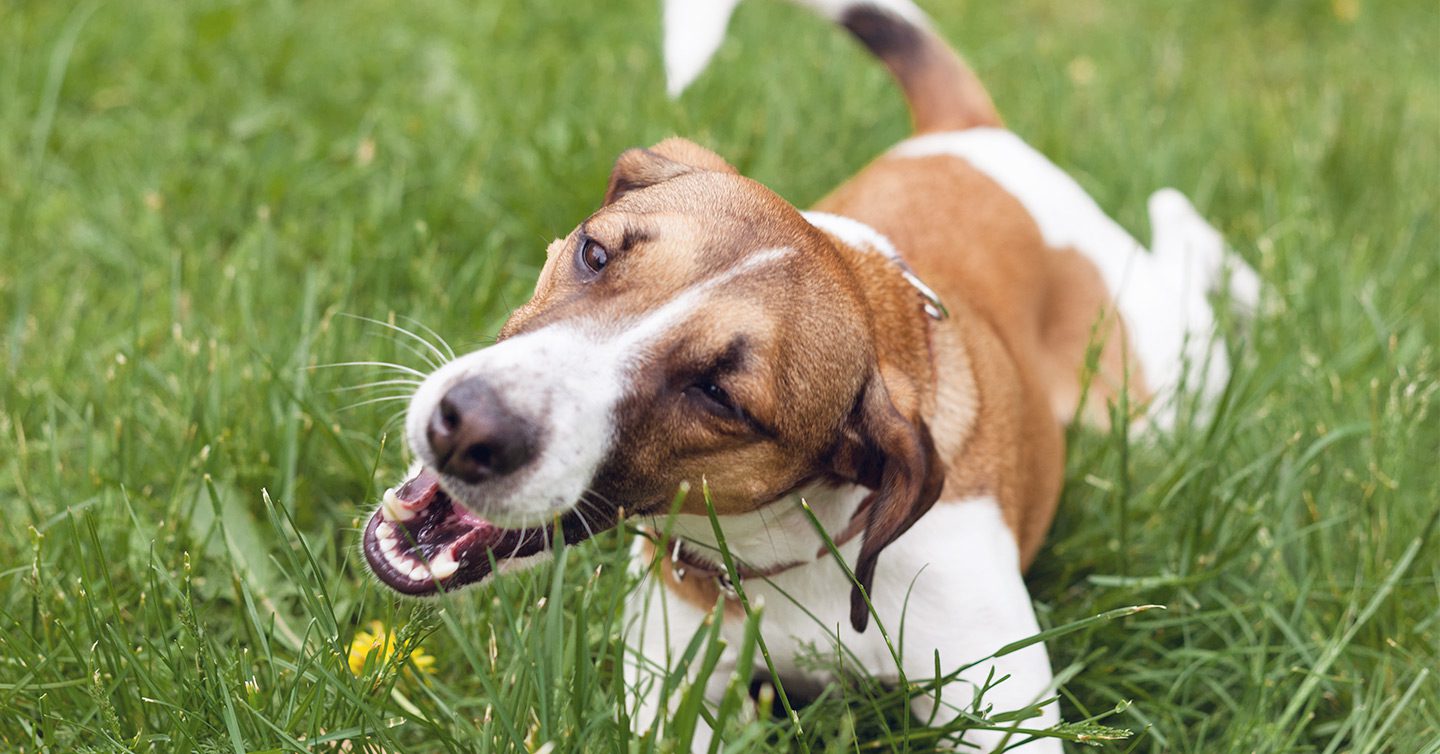As any dog parent can attest to, one of the (many) reasons that we love dogs is for their carefree natures and playful attitudes. Whether they’re zooming around in the yard or chasing their tails, we continue to be delighted and surprised by their behavior. One behavior that continues to puzzle dog parents, however, is eating grass.
Therefore, if you ever find yourself asking – Why does my dog eat grass? – you’re not alone. The good news is, that although there is a common misconception that dogs only eat grass when sick or have an upset stomach, studies show that there is no evidence to support this belief. In fact, according to research published by Science Direct, 79% reported that their dog had eaten grass or other plants at some point.
So, why do they do it then?
Although it’s difficult to say definitively why dogs eat grass, researchers and veterinarians have a few theories. Let’s dig in.
Grass eating in dogs is a fairly normal canine behavior.
When it comes down to it, most veterinarians will tell you that eating grass is a fairly normal and common behavior in dogs. According to the same study published in The Journal of Applied Animal Behavior Science, as many as 68% of dog parents reported that their dogs eat plants on a daily or weekly basis. Of the plants consumed, 79% reported that their dogs were specifically eating grass.
Nevertheless, this behavior, which is technically called “pica” (e.g. eating non-food items), continues to be the subject of discussion and debate among veterinarians and dog parents alike.
Pet Pro Tip: Illnesses won’t wait to happen. You shouldn’t wait to enroll in pet insurance. From common parasite infections, to costly hereditary illnesses, pet insurance is worth it and can cover crucial eligible treatment your pet may need for their unexpected accidents and illnesses. Find out how pet insurance works, what pet insurance covers, and choose a plan today.
So, what answers do we have about why dogs eat grass?
They like the way it tastes.
Occam’s razor suggests that the simplest answer to a question is the most likely. Why do dogs eat grass? Perhaps they just like the way it tastes.
Due to the prevalence of eating grass and other plants among dogs, some veterinarians and researchers believe that dogs who eat grass could simply enjoy it – whether they like the taste, the feel, or the smell.
This same idea can be applied to a number of other things that dogs are apt to eat – socks, garbage, rocks, all kinds of things that we, as humans, deem unusual and strange – but might be perfectly enjoyable to dogs.
It’s an instinctual behavior.
On the other hand, some experts theorize that dogs eating grass is an instinctual behavior.
Before dogs were domesticated to the companions we know and love today, their ancestors hunted in the wild. As a result, their diets were much more versatile and included bones, meat, organs, and even stomach contents of their prey.
At this time, dogs were neither true carnivores, nor true omnivores – undomesticated dogs ate all parts of their prey in order to achieve a balanced diet which would have included grass in the stomach contents of the animal. In fact, researchers studying wolves today have found evidence of grass in the stool of 2% to 47% of samples studied.
Therefore, we can make a hypothesis that as dogs were domesticated, they maintained that instinct as scavengers to eat other items – grass among them – that weren’t part of their typical, meat-focused diet.
It’s a psychological behavior.
In a different vein, some animal behaviorists believe that dogs eating grass is a comfort mechanism used to cope with stress, anxiety, or loneliness – similar to hair-twirling or nail-biting in humans. In other words, this theory suggests that dogs eat grass to pass the time when they’re bored, to calm their nerves when left alone, or to try and get your attention when they feel ignored.
This theory is similar to why puppies who are left alone chew furniture or other items. Whether they’re bored, anxious, or lonely, the chewing gives them something to do, and can be comforting. Not to mention, it gets our attention. All of the same can be said for grass eating.
It’s a physical behavior related to diet or digestion.
Finally, although there is no evidence to say dogs eat grass when they’re sick, or eat it to make themselves sick, there’s also nothing to definitively say that eating grass isn’t some kind of diet or digestion-related behavior.
Rather than being related to sickness, some experts believe that dogs might sometimes eat grass to aid in digestion – a way of self-curing an irritated stomach. Additionally, another theory suggests that dogs eat grass to add fiber to their diet that they might be missing with their current dog food. As a source of fiber, eating grass can help remedy this nutritional deficiency, and in turn help dogs digest food and poop more easily.
In fact, a unique study published in The Journal of Veterinary Medicine and Science reported that an 11-year-old Poodle who had been continuously eating grass and vomiting (with no other found health conditions) stopped this behavior after his parent put him on a high-fiber diet!
Should I be concerned?
It seems the question of dogs eating grass comes up again and again simply because dog parents want to make sure their pets are happy and healthy. The good news is, grass-eating shouldn’t be cause for concern in most cases. If, however, you find your dog suddenly eating grass in conjunction with other unusual behavior – lethargy, diarrhea, weight loss, etc. – you’ll want to talk to your veterinarian to ensure there’s not something else going on.
Additionally, you’ll want to ensure that if your dog is eating grass or other plants, that they’re not consuming potentially harmful pesticides or herbicides used on lawns, or potentially harmful plants. Although some grass and plants in your yard may be safe for dogs to consume, there are a number of common house plants that can be toxic to dogs.
The bottom line…
While dogs eating grass isn’t typically cause for concern, many dog parents still look for ways to eliminate this behavior. If you’d like to encourage your dog to stop eating grass, you might try some of these strategies:
- Positive reinforcement: Just as you would teach your dog to sit or stay using treats and positive reinforcement, you can use the same methodology to train your dog to stop eating grass. Any time your dog starts eating grass, you can offer him a treat, toy, walk, or any “better” alternative to train him out of this behavior.
- Exercise and stimulation: Many behavioral issues in dogs can be remedied with exercise and stimulation. If you think your dog is eating grass as a result of boredom, anxiety, or loneliness, you can try to mitigate this behavior by ensuring that they get enough exercise and mental stimulation – whether it’s a puzzle game, training, or a trip to the dog park.
- Diet changes: Finally, you might try switching your dog to a high-fiber diet and see if this has any effect on their grass-eating habits. If your dog stops eating grass with the diet change, that’s great! If they continues the habit, you might look into other strategies to curb this behavior.
Ultimately, we all want what’s best for our dogs, so if you ever find yourself with lingering questions or concerns about your dog’s behavior, you shouldn’t be afraid to reach out to your veterinarian for advice.




